By Georgia Whiteside
This set of photography is titled Plastic’s Chokehold and features different images of nature entangled by sheets of thin plastic.
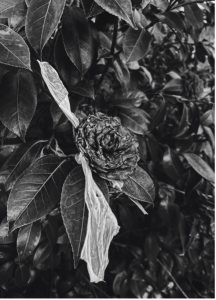
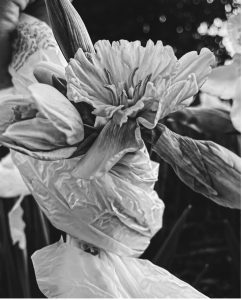
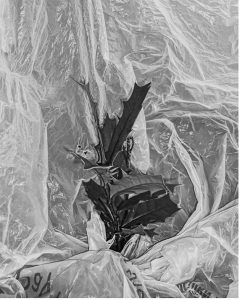
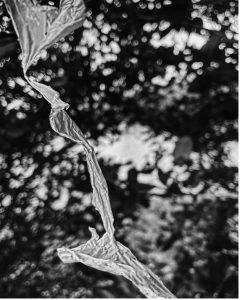
Photographs by Georgia Whiteside
These images are intended to be an emotional, visual, representation of the American Chemical Society ‘s Article Degradation Rates of Plastics in the Environment written by Ali Chamas, Hyunjin Moon, Jiajia Zheng, Yang Qiu, Tarnuma Tabassum, Jun Hee Jang, Mahdi Abu-Omar, Susannah L. Scott, and Sangwon Suh.
Their specific data can be found below:
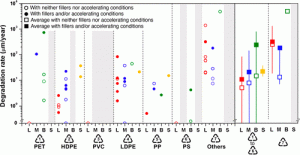
“Figure 8. Specific surface degradation rates for various plastics, in μm year–1. Vertical columns represent different environmental conditions (L, landfill/compost/soil; M, marine; B, biological; S, sunlight) and plastics types (represented by their resin identification codes). Plastics type 7, “others”, corresponds to various nominally biodegradable plastics. The range and average value for plastics types 1–6 are shown on the right as lines and squares, respectively, as well as for biodegradable “others”. Data points representing degradation rates that were unmeasurably slow are shown on the x-axis. Gray columns represent combinations for which no data were found.” Feb 3, 2020. (https://pubs.acs.org/doi/10.1021/acssuschemeng.9b06635)
To summarize this article there are varying points at which plastic is unsustained in our environment and chemically unable to break down. Leaving varying chemical compounds littered in nature. These images are intended to invoke the feeling of disbelief and struggle accosted with this fact. That there is a constant power dynamic between the compounds we find in our environment and the compounds we it litter with. And how one is suffocating the other. These images are a struggle that needs a harsh light shown on it. My hope is that the juxtaposition shows just how incompatible these two forces are, and why they should not be so intertwined. As one corrodes and suffocates the other, we must do our best to prevent further harm done by litter in our environment and advocate for change.